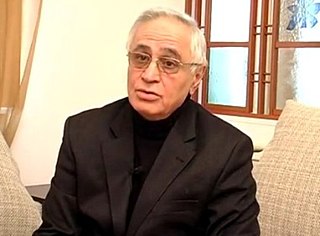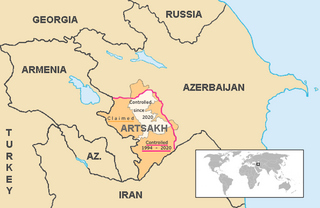Related Research Articles

Vazgen Sargsyan was an Armenian military commander and politician. He was the first Defence Minister of Armenia from 1991 to 1992 and then from 1995 to 1999. He served as Armenia's Prime Minister from 11 June 1999 until his assassination on 27 October of that year. He rose to prominence during the mass movement for the unification of Nagorno-Karabakh with Armenia in the late 1980s and led Armenian volunteer groups during the early clashes with Azerbaijani forces. Appointed Defence Minister by President Levon Ter-Petrosyan soon after Armenia's independence from the Soviet Union in late 1991, Sargsyan became the most prominent commander of Armenian forces during the Nagorno-Karabakh War. In different positions, he regulated the military operations in the war area until 1994, when a ceasefire was reached ending the war with the de facto unification of Nagorno-Karabakh Republic with Armenia.

Artsakh, officially the Republic of Artsakh or the Nagorno-Karabakh Republic, is a breakaway state in the South Caucasus that is internationally recognized as a part of Azerbaijan. Artsakh controls most of the territory of the former Nagorno-Karabakh Autonomous Oblast along with some surrounding territory, having borders with Armenia to the west and Iran to the south. Its capital is Stepanakert.

Arkadi Ghukasyan was the second President of the self-proclaimed Nagorno-Karabakh Republic. He was elected as the President on 8 September 1997 and re-elected in 2002, until his term ended on 7 September 2007 and was succeeded by Bako Sahakyan.

The Nagorno-Karabakh War, referred to in Armenia as the Artsakh Liberation War, was an ethnic and territorial conflict that took place in the late 1980s to May 1994, in the enclave of Nagorno-Karabakh in southwestern Azerbaijan, between the majority ethnic Armenians of Nagorno-Karabakh backed by Armenia, and the Republic of Azerbaijan. As the war progressed, Armenia and Azerbaijan, both former Soviet Republics, entangled themselves in protracted, undeclared mountain warfare in the mountainous heights of Karabakh as Azerbaijan attempted to curb the secessionist movement in Nagorno-Karabakh. The enclave's parliament had voted in favor of uniting itself with Armenia and a referendum, boycotted by the Azerbaijani population of Nagorno-Karabakh, was held, whereby most of the voters voted in favor of independence. The demand to unify with Armenia began in a relatively peaceful manner in 1988; in the following months, as the Soviet Union disintegrated, it gradually grew into an increasingly violent conflict between Armenians and Azerbaijanis, resulting in ethnic cleansing, with Sumgait pogrom (1988), Baku pogrom (1990) and Khojaly Massacre (1992) being notable examples. Inter-ethnic clashes between the two broke out shortly after the parliament of the Nagorno-Karabakh Autonomous Oblast (NKAO) in Azerbaijan voted to unify the region with Armenia on 20 February 1988. The declaration of secession from Azerbaijan was the final result of a territorial conflict regarding the land. As Azerbaijan declared its independence from the Soviet Union and removed the powers held by the enclave's government, the Armenian majority voted to secede from Azerbaijan and in the process proclaimed the unrecognized Republic of Nagorno-Karabakh.

The Artsakh Republic Defence Army is the formal defence force of the largely unrecognized Republic of Artsakh (Nagorno-Karabakh). Established in 1992, it united previously disorganized self-defence units which were formed in the early 1990s with the avowed goal of protecting the ethnic Armenian population of Artsakh from the attacks by the Soviet and Azerbaijani armed forces. The Nagorno-Karabakh Defence Army is currently composed of around 20,000 well-trained and equipped officers and soldiers and maintains a "constant state of readiness, undergoing more serious combat training and operational exercises than any other former Soviet army.". The President of Azerbaijan Ilham Aliyev has stated that 80% of the soldiers in Nagorno-Karabakh Defence Army are actually Armenian citizens.

The Nagorno-Karabakh conflict is an ethnic and territorial conflict between Armenia and Azerbaijan over the disputed region of Nagorno-Karabakh and seven surrounding districts, which are de facto controlled by the self-declared Republic of Artsakh, but are internationally recognized as de jure part of Azerbaijan. The conflict has its origins in the early 20th century. Under the Soviet Union, Joseph Stalin decided to make the Nagorno-Karabakh region an autonomous oblast of Soviet Azerbaijan. The present conflict began in 1988, when the Karabakh Armenians demanded that Karabakh be transferred from Soviet Azerbaijan to Soviet Armenia. The conflict escalated into a full-scale war in the early 1990s.

Serzh Sargsyan is an Armenian politician who served twice as the Prime Minister of Armenia and was the third President of Armenia, from 2008 to 2018. He won the February 2008 presidential election with the backing of the ruling Republican Party of Armenia, a party in which he serves as chairman, and took office in April 2008. On 18 February 2013, he was re-elected as president and served the entire term.
Artsakh is located in the southern part of the Lesser Caucasus range, at the eastern edge of the Armenian Highlands, encompassing the highland part of the wider geographical region known as Karabakh. Under Russian and Soviet rule, the region came to be known as Nagorno-Karabakh, meaning "Mountainous Karabakh" in Russian. The name Karabakh itself was first employed in Georgian and Persian sources from the 13th and 14th centuries to refer to an Armenian principality known by modern historians as the Kingdom of Artsakh or Khachen.

Azerbaijan–Turkey relations have always been strong with the two often being described as "one nation with two states" by the ex-president of Azerbaijan Heydar Aliyev due to both being Turkic countries. Turkey was the first state to recognize Azerbaijan's independence in 1991 and has been a staunch supporter of Azerbaijan in its efforts to consolidate its independence, preserve its territorial integrity and realize its economic potential arising from the rich natural resources of the Caspian Sea. The two countries share an 11-kilometer border, with the Aras River separating Turkey from the Nakhchivan exclave of Azerbaijan.

Seyran Ohanyan is a former Defence Minister of Armenia. He held this position since 14 April 2008 until 3 October 2016.

There are no diplomatic relations between Armenia and Azerbaijan, largely due to the ongoing Nagorno-Karabakh conflict. The neighboring nations had formal governmental relations between 1918 and 1921, during their brief independence from the collapsed Russian Empire, as the First Republic of Armenia and the Democratic Republic of Azerbaijan; these relations existed from the period after the Russian Revolution until they were occupied and annexed by the Soviet Union. Due to the two wars waged by the countries in the past century—one from 1918 to 1921 and another from 1988 to 1994—the two have had strained relations.

The United States and Azerbaijan have had diplomatic relations since 1994.

The following outline is provided as an overview and topical guide of the Republic of Artsakh and Nagorno-Karabakh region:
This page list topics related to the Republic of Artsakh and Nagorno-Karabakh region.

Rahim Hasan oglu Gaziyev was Azerbaijani Defense Minister in 1992–1993, in the turmoil of the Nagorno-Karabakh War, and later a political prisoner.
Miatsum is a concept and a slogan used during the Karabakh movement in the late 1980s and early 1990s, which led to the Nagorno-Karabakh War in 1992–1994.

Presidential elections were held in Nagorno-Karabakh on 19 July 2012. Incumbent President Bako Sahakyan was re-elected for a second five-year term, receiving around two-thirds of the vote.

The political status of the Nagorno-Karabakh region remains unresolved. Since 1991, it has been largely controlled by the self-proclaimed Republic of Artsakh, a de facto independent entity. The region, however, is internationally recognized as an integral part of Azerbaijan, although it has not exercised power over most of the region since 1991. Since the end of the Nagorno-Karabakh War in 1994, representatives of the governments of Armenia and Azerbaijan have been holding peace talks mediated by the OSCE Minsk Group on the region's disputed status.

Hayk Sargsi Kotanjian is an Armenian military diplomat, academic and political adviser. Kotanjian is the author of several monographs in Russian, English and German as well as numerous articles on crisis management, ethnic conflict, security, defense and strategic studies, and cyberpsychology. Since 2005, he has headed the Institute for National Strategic Studies (INSS) in Yerevan and since 2016 has been the Head of the National Defense Research University. He also chairs the Political Science Association and the Board of Conferment of Academic Degrees in Political Science and International Relations of the National Academy of Sciences of Armenia.

The Four-Day War, or April War, began along the Nagorno-Karabakh line of contact on 1 April 2016 with the Nagorno-Karabakh Defense Army, backed by the Armenian Armed Forces, on one side and the Azerbaijani Armed Forces on the other.
References
- ↑ Department of Information Services, "Parliamentary Information List", accessed 09.01.11
- ↑ The Heritage Foundation, “”, accessed 23.06.18
- 1 2 The Heritage Foundation, "Luke Coffey", accessed 26.12.14
- ↑ CENSA Website, "Membership directory Archived 2010-11-25 at the Wayback Machine ", accessed 09.01.11
- ↑ Isabel Oakeshott , "Minister lets US ‘mole’ roam MoD", The Sunday Times, 06.06.10, accessed 12.09.10
- ↑ Official Record, "", accessed 09.01.11
- ↑ Altstadt, Audrey L. (28 February 2018). "Partnerships with Corrupt Regimes Are Not in the National Interest". National Interest .
- ↑ Coffey, Luke; Nifti, Efgan (28 May 2018). "Why the West Needs Azerbaijan". Foreign Policy .
- ↑ Coffey, Luke (25 January 2018). "America Needs Strategic Partners like Azerbaijan". National Interest .
- ↑ Nigmatulina, Anna (5 March 2015). "Tensions reignite in the Nagorno-Karabakh conflict". Al Jazeera .
- ↑ https://twitter.com/LukeDCoffey/status/916078602608873472
- ↑ https://twitter.com/LukeDCoffey/status/960975012877537280
- ↑ https://2001-2009.state.gov/p/eur/rls/or/13508.htm